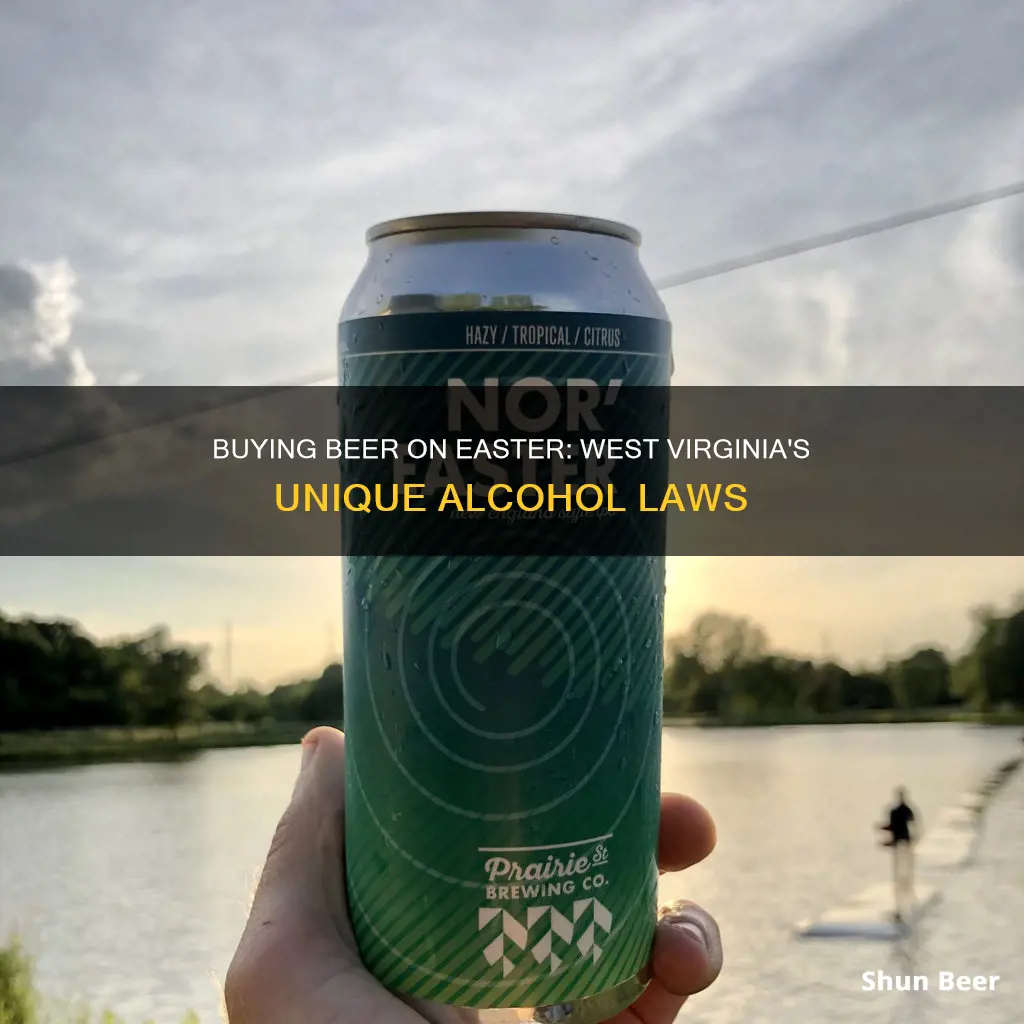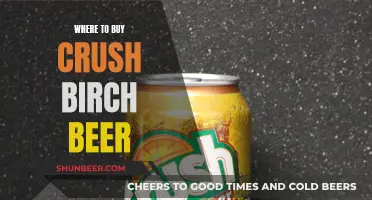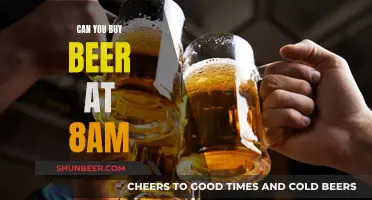
Alcohol laws in West Virginia can be quite complex. While you can buy beer in the state 7 days a week, there are certain days when the sale of liquor is prohibited. So, can you buy beer on Easter Sunday in West Virginia?
| Characteristics | Values |
|---|---|
| Beer sales on Easter Sunday | Allowed |
| Wine sales on Easter Sunday | Allowed |
| Liquor sales on Easter Sunday | Not allowed in retail liquor outlets for off-premises sales |
| Liquor sales on Easter Sunday | Allowed in bars and restaurants |
What You'll Learn

Beer can be bought in West Virginia 7 days a week
In West Virginia, beer can be purchased seven days a week, including on Easter Sunday. However, it is important to note that there are specific time restrictions for the sale of beer and other alcoholic beverages. Beer and wine can be sold by off-premise retailers from 6 a.m. to 2 a.m. every day, while liquor sales for off-premise consumption are allowed until midnight.
On Easter Sunday specifically, there are additional restrictions on liquor sales. The West Virginia Alcohol Beverage Control Administration (WVABCA) has reminded residents that liquor sales are prohibited at retail liquor outlets for off-premise sales on this day. This means that liquor stores are not allowed to sell liquor for off-premises consumption on Easter Sunday. However, the restriction does not apply to on-premises licenses, such as those held by bars and restaurants, which can still sell liquor on this day.
The sale of beer and wine is not prohibited on Easter Sunday, and off-premise retailers can sell these beverages during their usual hours of 6 a.m. to 2 a.m. This includes various types of retailers, such as package and liquor stores, grocery stores, gas stations, and more.
It is worth noting that West Virginia's alcohol laws can be complex, and there may be additional regulations or exceptions to those mentioned above. Additionally, individual counties and localities within the state may have their own specific regulations regarding alcohol sales. Therefore, it is always a good idea to check the specific laws and regulations in your area.
Navigating Beer Runs: Outings During Lockdowns
You may want to see also

Liquor sales are prohibited on Easter Sunday
In West Virginia, the sale of liquor is prohibited on Easter Sunday. This means that liquor stores are not allowed to sell liquor for off-premises consumption on this day. However, it is important to note that this restriction does not apply to the sale of beer and wine, which can still be purchased for off-premises consumption. Additionally, bars and restaurants with on-premises licenses are permitted to sell liquor on Easter Sunday.
The West Virginia Alcohol Beverage Control Administration (WVABCA) has issued reminders about this restriction to residents of the state. The WVABCA is responsible for regulating the sale of alcohol in the state and has clarified that the restriction applies specifically to retail liquor outlets for off-premises sales.
While liquor sales are prohibited on Easter Sunday, West Virginia's alcohol laws allow for the sale of alcohol seven days a week. On-premise retailers, such as bars and restaurants, can sell all forms of alcohol between 6 a.m. and 2 a.m. every day. Off-premise retailers, including grocery and convenience stores, can sell beer and wine during the same hours, but liquor sales for off-premise consumption are cut off at midnight.
The laws regarding alcohol sales in West Virginia can be complex, and there are some unique aspects to how alcohol is regulated in the state. For example, the state constitution prohibits the consumption of "intoxicating liquors" in "public places," but this has been worked around by redefining standard beer as "non-intoxicating beer." Additionally, while West Virginia is not a dry state, it does have one dry area: the town of Brandonville, where the sale of alcohol is prohibited.
Buying Beer in Massachusetts on Christmas: What's the Deal?
You may want to see also

Off-premise consumption retailers can sell beer and wine from 6 a.m. to 2 a.m
In West Virginia, off-premise consumption retailers can sell beer and wine from 6 a.m. to 2 a.m. every day. This includes grocery stores, gas stations, and package and liquor stores. However, there are some important exceptions and additional regulations to be aware of.
Firstly, the sale of liquor is prohibited from 12:00 midnight to 6:00 a.m. each day, and all day on Easter Sunday and Christmas Day. So, while you can buy beer and wine on Easter Sunday in West Virginia, you cannot buy liquor. This restriction applies to off-premises sales from liquor stores, but does not apply to on-premises licenses held by bars and restaurants, which can sell liquor on Easter Sunday.
Secondly, while West Virginia does not prohibit the sale of alcohol, the town of Brandonville is the state's only dry area, meaning that no alcohol can be purchased there.
Finally, it is worth noting that the hours for liquor sales are different for off-premise retailers compared to bars and restaurants. Off-premise retailers can sell liquor between 6 a.m. and midnight, while bars and restaurants can sell liquor from 6 a.m. to 2 a.m.
These regulations are part of West Virginia's alcohol laws, which can be complex and include various "work-arounds" to the state constitution's prohibition on the consumption of "intoxicating liquors" in "public places."
Buying Beer on Sundays: B Street's Availability
You may want to see also

Liquor stores must close on Easter Sunday, Christmas Day, and Sundays
In West Virginia, the sale of liquor is prohibited on Easter Sunday, Christmas Day, and Sundays. This means that liquor stores must close on these days. The sale of beer and wine is not restricted on these days, and can be sold for off-premise consumption.
On-premise retailers, such as bars and restaurants, are permitted to sell all forms of alcohol, including liquor, on these days. These establishments can sell alcohol between 6 a.m. and 2 a.m. every day, including Easter Sunday, Christmas Day, and Sundays.
It is important to note that the West Virginia Alcohol Beverage Control Administration (WVABCA) has issued reminders about these restrictions, specifically highlighting that liquor sales are prohibited at retail liquor outlets for off-premise sales on Easter Sunday. This restriction does not apply to on-premises licenses held by bars and restaurants.
The laws regarding alcohol sales in West Virginia are complex, and while the state constitution prohibits the consumption of "intoxicating liquors" in "public places," there are work-arounds that allow for the sale and consumption of alcohol in certain settings.
West Virginia is not a dry state, and alcohol is widely available throughout the state, with the exception of the town of Brandonville, which is the only dry area in the state.
Early Morning Beer Runs: Can I Buy Before 9 AM?
You may want to see also

West Virginia is not a dry state
The retail sale of beer and wine has been allowed in general, privately-owned stores since 1934. Wine was transferred from state-owned stores to private sale in 1981. Liquor was only sold in state-owned stores until 1990, when the state auctioned off permits to private businesses.
West Virginia allows localities to exercise a local option by public referendum to prohibit the sale of liquor. As of 2020, all counties in West Virginia are wet for off-premises consumption. There are no dry counties in the state, but there is one dry municipality: Brandonville.
The sale of alcohol is prohibited on Easter Sunday and Christmas Day. Retail sales of beer and wine are prohibited daily between 2:00 a.m. and 6:00 a.m.
Buying Beer on Sundays: Brunswick County Laws Explained
You may want to see also
Frequently asked questions
Yes, you can buy beer on Easter Sunday in West Virginia. However, this only applies to off-premises consumption.
The sale of liquor is prohibited on Easter Sunday in West Virginia. This only applies to off-premises sales from liquor stores.
The sale of wine is not restricted on Easter Sunday in West Virginia. This applies to off-premises consumption.
Off-premises retailers can sell beer and wine from 6 a.m. to 2 a.m. Liquor sales are prohibited after midnight.







